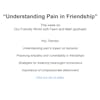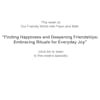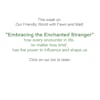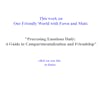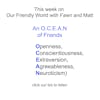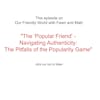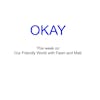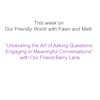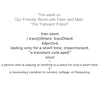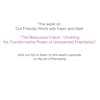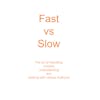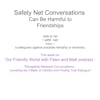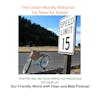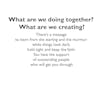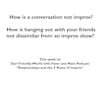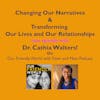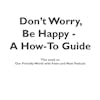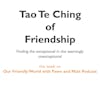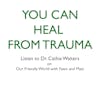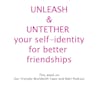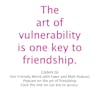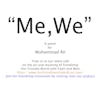
Radical Acceptance for Friendships, Careers, and Life with Dr. Cathia Walters

Dr. Walters is back to teach us about Radical Acceptance - how does it play into our life choices, finances, career, and relationships? We discuss how to separate our thoughts from our feelings, how to cultivate self-worth, how to deal with rejection, and soooooooo much more!
Socials and Web for Walters Wellness Group / Dr. Cathia Walters:
https://www.instagram.com/walterswellnessgroup_/
https://www.facebook.com/WaltersWellnessGroup
https://www.linkedin.com
Dr. Cathia Walters (Dr. C) is an educator, psychologist, relationship coach, and the founder of the Walters Wellness Group in California's San Francisco Bay area.
Through the Walters Wellness Group, Dr. C provides support groups, courses (online and in-person), workshops and community events on a variety of healing-related topics. Her courses like Managing Life Challenges course, Black Women's Support Group, and Healing Trauma program have served hundreds of individuals in healing and personal growth. Dr. C's work focuses on compassion in healing and incorporates movement into the healing journey.
Dr. C designs and hosts annual retreats for Black women in Runaway Bay, Jamaica, a biannual retreat for Black couples in Lake Tahoe, California, and a retreat for managing trauma in Costa Rica. Dr. C also provides training and hosts webinars and workshops on a variety of healing and health-related topics for companies and organizations.
As a Black woman, Dr. Walters considers self-care a radical act that begins with the relationship one forms with oneself.

Dr. Walters is back to teach us about Radical Acceptance - how does it play into our life choices, finances, career, and relationships? We discuss how to separate our thoughts from our feelings, how to cultivate self-worth, how to deal with rejection, and soooooooo much more!
Socials and Web for Walters Wellness Group / Dr. Cathia Walters:
https://www.instagram.com/walterswellnessgroup_/
https://www.facebook.com/WaltersWellnessGroup
https://www.linkedin.com
Dr. Cathia Walters (Dr. C) is an educator, psychologist, relationship coach, and the founder of the Walters Wellness Group in California's San Francisco Bay area.
Through the Walters Wellness Group, Dr. C provides support groups, courses (online and in-person), workshops and community events on a variety of healing-related topics. Her courses like Managing Life Challenges course, Black Women's Support Group, and Healing Trauma program have served hundreds of individuals in healing and personal growth. Dr. C's work focuses on compassion in healing and incorporates movement into the healing journey.
Dr. C designs and hosts annual retreats for Black women in Runaway Bay, Jamaica, a biannual retreat for Black couples in Lake Tahoe, California, and a retreat for managing trauma in Costa Rica. Dr. C also provides training and hosts webinars and workshops on a variety of healing and health-related topics for companies and organizations.
As a Black woman, Dr. Walters considers self-care a radical act that begins with the relationship one forms with oneself.
Radical Acceptance
[00:00:00] FAWN: Welcome back, everybody. Welcome back. Guess who's with us again? Who? Dr. C. Dr. C. Remember Dr. Walters specializing in depression, relationship issues, trauma, PTs, D, everything. We love Dr. C. We call her Dr. C. Dr. Kathy Walters is here again, our very special friend. Your special friend. Welcome back Dr.
[00:00:24] DR. WALTERS: C. Good morning.
[00:00:27] DR. WALTERS: Good morning. Good morning. How are you guys doing? How is everyone doing today?
[00:00:31] FAWN: I'm feeling feisty. Dr. C.
[00:00:33] MATT: Oh dear. I don't know. Feist love is. Love is winning
like
[00:00:37] DR. WALTERS: that. I love that.
[00:00:38] FAWN: Matt's already starting with the love is winning. Love is winning. He's afraid. He's afraid.
[00:00:44] DR. WALTERS: Hey, it's always a good thing when love wins, right?
[00:00:46] DR. WALTERS: Indeed.
[00:00:48] FAWN: Yes. Those are our fighting words though. Like those are our stop fighting words. Those are our fighting
[00:00:52] MATT: words. Love is winning. Ah,
[00:00:54] DR. WALTERS: ah. So our code words, right. We call it in relationship, we call it the code word, right? Because that's what it's, well, let me make sure. So you saying when we say love is winning, it means, let's take a breather, let's pause,
[00:01:07] MATT: let's remember what, let's end it.
[00:01:09] MATT: Let's remember why we're here.
[00:01:10] DR. WALTERS: Period. Mm-hmm.
[00:01:12] FAWN: It means that there is no. No winning. We did an episode on this, a, a few episodes back, but there's no, there's no winning. We have to remember that it's not about, it doesn't matter. Like love needs to be the winner. Yeah.
[00:01:29] MATT: It's, it's, it's not about me scoring points or mm-hmm.
[00:01:32] MATT: Yeah. Fawn scoring points. It's just about us going forward and
[00:01:36] FAWN: growing and if we continue down this path, it's just, a no win situation. So love is winning, but I
[00:01:43] DR. WALTERS: like that
[00:01:44] FAWN: anyways. So someone, it's kind of like martial arts. If someone has you or you're in a, in a bind, and if you pursue it, you have to tap if you feel like your joints are gonna break.
[00:01:57] FAWN: Mm-hmm. Mm-hmm. Or if you're in trouble. So it's, it's our way to tap saying love is winning. So we just, everybody stops respectfully, even though they're pissed.
[00:02:08] DR. WALTERS: Even though I like that. I like that. Yeah. When I work with my couples, I call that you all have to have a code word. And once that code word is said, we all know that
[00:02:17] DR. WALTERS: okay, whatever's happening right now is not going down the path we need for it to go. Meaning it's not going in a healthy direction. So we need to take a breather. Yeah, right. And remind yourself that there's multiple realities. So I like that. Love is winning. Yes.
[00:02:31] FAWN: And it's accepting that love is the key to everything.
[00:02:35] FAWN: So if, if there's no love here, there's no way we can do anything. So you just accept it. Love is winning. Love is it. Speaking of acceptance, that's what we're gonna talk about today. Radical acceptance. Mm-hmm. Interesting topic. Because Matt, you asked, you know, what does that even mean? So of course I had to look it up.
[00:02:58] FAWN: But radical as we were talking to Dr. C about this, off the air, we were saying how does it play into our life choices, our finances, career, relationships? So of course I had to really think about. Radical acceptance. I feel like I, for the most part have radical acceptance, which can sometimes get me in trouble because I just accept everyone.
[00:03:26] FAWN: I don't judge. And that's, I think, where my meaning of it comes in. I'm less discerning. I am willing to give you a full on pass to be who you are. And I love you unconditionally. Like it's, I'm completely open. But am I, because if we talk about career and finances, you know, maybe I'm not as accepting in every situation in life or every, every aspect.
[00:03:55] FAWN: and definitely self-acceptance, for me, I've noticed the past few weeks I've been looking at that, I'm like, whoa, I am not a self-accepting kind of person. I've been, you know, I'm always very harsh with myself. I have a completely distorted view of what I look like, and, you know, it's bad. I'm, I'm very hard on myself.
[00:04:21] FAWN: But anyway, it's not about me. It's about all of us. I do wanna talk about how does self-acceptance play into the equation, because I think that the more we fully accept and love ourselves, the more we can accept ourselves, period, the better our understanding and our appreciation for other people will be.
[00:04:44] FAWN: And I think that's key to having a thriving friendship, having a beautiful society. And so here we go. Let's go to the etymology of both words. The first one, radical and then the second word, acceptance. I looked up radical. It comes from the 14th century, and this is what it means: originating in the root or ground.
[00:05:11] FAWN: So radical means originating in the root or ground, and then it said of body parts or fluids, and also something that's vital to life. It's from the Latin radicalis, which is "of or having roots". Isn't that interesting? Radical? I would never would've
[00:05:37] MATT: thought, well, in math, uh, five Radical two is an expression that comes up in like trigonometry, and it does involve roots.
[00:05:46] MATT: So math stole from Latin. What a shock.
[00:05:50] FAWN: Math follows me again. So now let's go look at acceptance. And that was pretty straightforward. It's the action of taking or receiving what is offered. So putting those together. I feel like Guss was, it was his name, Guss from My Big Fat Greek Wedding. And I am Gus and I am Guss.
[00:06:12] FAWN: So the roots is, this is the roots. Oh dear. You know how you always broke down? Yes. The root of
[00:06:17] MATT: every word is Greek.
[00:06:19] FAWN: So what is the root of acceptance? What is the root of acceptance? For me, it's love and freedom For me to truly accept something, , I need to feel love and a certain amount of, like an air of freedom about it.
[00:06:36] FAWN: Right now, that freedom could be, you're free to be who you are. I'm free to be who I am. The universe is grand and infinite, but I also, in my own personal way, I look at freedom, like sometimes you just gotta say f it. For me, that's, that's freedom. Sometimes that just translates to, a release, you know?
[00:07:00] FAWN: Right. So that's what I have to say. What do you all think?
[00:07:04] MATT: Oh my goodness. I am off in the twilight zone compared to this. I am like gone and I mean like gone because I'm like, Gee, Master Yoda said that, attachment is the way to the dark side of the force. Mm-hmm. And Buddhism teaches us that, suffering comes from attachment.
[00:07:24] MATT: Mm-hmm. So for me, thinking about this and oh my goodness. Yeah. I have a, yeah, I have a very strange place to go on this, but it, it centers around emotional detachment. And you know how we've talked about how when so many bad things happen, you just kind of, your mind kind of says, well, this is ludicrous, and what else could possibly happen?
[00:07:52] MATT: And in many ways, you start to reframe or you start to rethink about it, and you start to emotionally distance yourself from all the craziness that seems like it's coming at you. But fortunately we have an expert with us, so Doctor
[00:08:09] DR. WALTERS: C, help, help, help, help. Okay, so good morning again. So, radical acceptance.
[00:08:18] DR. WALTERS: You know, I've been using this term for a long time, and you know, fawn, I never thought about breaking it down the way you did. But I'm, I'm kind of with Matt. You know, I look at it more from the old Buddhist perspective that, there's this belief that suffering comes not from the pain, but how we attach to that pain, right?
[00:08:39] DR. WALTERS: And so if we kind of understand that, that concept, if I'm thinking about how I'm attaching to this pain, then it tells me that I have a choice here. Right. I have a choice in terms of how, what the connection is that I make to this pain. And so one of the things I always say, you know, pain is inevitable, but suffering is a choice, right?
[00:09:02] DR. WALTERS: And suffering is a choice because I'm choosing how I deal with this, whatever this is. Right? And so you talked earlier about, life choices, finances, and I think you mentioned career. Right. So when I say radical acceptance, this is how I look at it. It is what it is, right? Life is gonna happen, right?
[00:09:27] DR. WALTERS: It doesn't matter what I do, it doesn't matter what I say. Life is gonna happen. I don't have to like it, and I surely don't have to agree with it, right? So when we're talking about whether it's relationship, how my finances doesn't matter. I don't have to like it and I don't have to agree with it. But if I want to survive, I wanna live, not just exist, right?
[00:09:51] DR. WALTERS: Because we can choose to exist or we can choose to live. But if I'm choosing to live, then I have to say, this is it, right? And if this is it, then what relationship do I want to have with this? Again, whatever this is. You know, you guys talked earlier about. You know, um, oh God, I forgot your quote. I should have wrote it down.
[00:10:15] DR. WALTERS: Love is, love is winning. Love is winning, right? So think of it along those lines. Love is winning. If I'm always fighting, if I'm always angry, right? If I'm always in that negative realm, what am I winning, right? If I'm always going up against things that I have no control over. How do I win? What do I win?
[00:10:44] DR. WALTERS: The only thing that comes up is I feel more angry or more anger. Right. I withdraw, I get sad. And guess what? The situation is still there. Right? It's still there. Right, right. But the peace I wanna make, clear is that, and it's about something you said earlier. Is that when we radically, the way I look at the concept of radical acceptance, it doesn't means that I don't have good boundaries.
[00:11:14] DR. WALTERS: As a matter of fact, it's the opposite, right? Because it comes with choices. So when I say radical acceptance, it is what it is. I don't have to like it. I don't have to agree with it. What I'm saying is I need to make sure that I'm okay, and so I'm making a choice that's in my best interest, right? I'm not gonna pick a fight with you today.
[00:11:36] DR. WALTERS: Because it's not worth it. Does that mean that I may not come back and have a conversation with you at a later point? I can, but right now, in this moment, I'm establishing my boundaries because right now it's not working for me. And if I need to get to the other side, I need to do what I need to do right now to get to the other side.
[00:12:01] DR. WALTERS: So it means let me step away. Right. Let me disengage, right? Or let me find one good thing about this interaction that makes it okay to be in this interaction, right? It is what it is. I don't have to like it. I don't have to agree with what you're doing. However, we are in a relational dynamic. We're in a relationship, we're coworkers.
[00:12:33] DR. WALTERS: We have a project that needs to be done right. There's a due date. I don't have to like you.
[00:12:39] MATT: Right, right. And, and I think oftentimes familial kind of relationships, people have to get to a point. I had to get to a point of just simply put, not caring what the burdens that my family would wish to place on me.
[00:12:57] MATT: If I wanted to maintain that relationship mm-hmm. I had to detach from that and literally not care. Mm-hmm. You know, to the point where, mm-hmm. You know, even, even as recently as just over a year ago, my dad said, you know, you better do this thing, or, you know, it's not, it's not okay. You have to do this. And I said, no, I'm not going to.
[00:13:18] FAWN: He said, he will never forgive you.
[00:13:20] MATT: He said, he will never forgive me. Boom. Okay. Rock on.
[00:13:23] FAWN: And you were, it was something that was for the best. Mm-hmm. Healthiest interest for Matt and actually the whole family. But really for Matt's,, wellbeing, he had to put us, put that boundary, but it was in conflict with the, um, the, uh, what do you call it, the expectation.
[00:13:46] FAWN: Thank you expectations that's wanted of us in society. Right? Right. And so we knew that if we took that path, it would be detrimental for Matt's wellbeing. For for the kids wellbeing. Mm-hmm. Mm-hmm. So we decided to respectfully not do what they were expecting.
[00:14:11] MATT: Well, I don't know if it was respectful or not.
[00:14:13] MATT: I didn't No, we were respectful. I did what I
[00:14:14] FAWN: chose to do. No, I'm saying respectful as in. We
[00:14:18] FAWN: didn't say, no, we're not gonna do it.
[00:14:20] FAWN: We were trying to explain in a loving way, and we were doing everything in our power to still be there for them without having to physically be there because we couldn't handle physically being there for several reasons.
[00:14:35] FAWN: We couldn't handle it financially. We couldn't handle it emotionally. We couldn't handle it physically. It was too much
[00:14:41] DR. WALTERS: trauma. Mm-hmm. Mm-hmm. So it came down to a choice. Right. Right. And that's the idea, right, is life is always gonna show up, right?
[00:14:50] MATT: Yes, it will.
[00:14:51] DR. WALTERS: Pain is inevitable, right? Right. So there's aspects of life if you wanna look at it from that perspective.
[00:14:57] DR. WALTERS: Family, friends, coworkers, you know, they're always gonna be there. How we choose to show up in those interactions. So when my dad is telling me, or demanding that I do something right? I get to make a choice again, reminding myself that every choice comes with a consequence. Right? Of course.
[00:15:21] MATT: Of
[00:15:21] DR. WALTERS: course.
[00:15:21] DR. WALTERS: Right, right. And so I need to decide in this situation here, what's my best course of action. So if we think of it in the context of, pain is in inevitable, suffering is a choice. I get to make a choice. I can do what my dad wants me to do or is demanding that I do and deal with a fallout from that.
[00:15:46] DR. WALTERS: Right. Right. Or I can hear what he's saying, understand what he's trying to say. Right. Right. Yeah. I don't have to agree with it. Right, right. And I can, at that branch, I can do it or I can choose not to. Right, right,
[00:16:02] MATT: right. And, and, and that's what it is. Mm-hmm. And a long time ago, I came to the place where I could distance.
[00:16:09] MATT: And I know that's a very hard thing for, for a lot of people. Mm-hmm. Um, and I, I consider myself very fortunate cuz I went through a very long period of a lot of anger. Welcome to high school. Mm-hmm. There was a lot of anger. Mm-hmm. And, you know, I bathed in it, but at some point, you know, fortunately I was able to let that go and move on.
[00:16:29] MATT: Mm-hmm. But, um, yeah, for that moment and, um, yeah, doctor, it's. It's funny you mentioned the things you mentioned, which is, you know, try and find, even good things inside of terrible things. Mm-hmm. Because, oh my Lord, I get things coming across my desk all the time. I get all my news from England, not from America.
[00:16:50] MATT: And one of the things that came across my reality was this piece written about one of the few remaining living, people who went through Auschwitz. Mm-hmm. And he knows radical acceptance. Holy cow. He knows radical acceptance. When he was on the train to Auschwitz, they saw a vapor trail from a plane go by and, you know, they're all starving and putting in these cattle cars.
[00:17:18] MATT: But everybody looked at that and said it was a good sign. They didn't know what it was, but they were like, somebody's watching out for us. So, you know, even in desperate situations, they were looking for something good, something happy, something. Mm-hmm. That they could hold onto. Mm-hmm. Yeah. Unbelievably powerful article.
[00:17:38] MATT: Um, and you, you know, when people ask him, um, you don't, you're not angry at these people. You're not furious, you know, he says, I feel pity. You know, he's completely distanced, the suffering from it. He's not forgotten it, but he's also not gonna burden others with it unless that's a place they, choose.
[00:18:05] MATT: Mm-hmm. To want to understand what he went through.
[00:18:09] DR. WALTERS: To be.
[00:18:10] MATT: But yeah, he said that, uh, mm-hmm. Hate is what human beings allow themselves to do.
[00:18:16] DR. WALTERS: It's a choice.
[00:18:18] DR. WALTERS: Right. It's a choice. It all come
[00:18:20] MATT: and if he can say that, mm-hmm. Who am I to say? I can't say that. Mm-hmm. Because he went through it at 12 years old. He went through it.
[00:18:29] DR. WALTERS: Yeah. Yeah. Absolutely. I think, when we think of the concept of anger, you know, you talk about being angry and high school and you know, and we've all had experiences, of having that feeling of anger, right? One of the things we have to remind ourselves is who is that anger serving?
[00:18:49] DR. WALTERS: Is it serving me? Right, right. Let me take a look at my stuff. How is this serving me? How's this getting me where I want to be, where I need to be? Right? The analogy of it's like a coal anger is a piece of hot coal in your hand, and I'm like, burn him, burn her, burn him, burn her, right? But who? But at the end of my willingness to burn somebody, what's happening to my hand?
[00:19:15] DR. WALTERS: I'm walking away with this big old hole, this gigantic hole in my hand. Right. Because the only person it's burning is me. Right, right. So when we think about radical acceptance, when we think about boundaries, because I think one of the things, without naming it, I'm, I'm hearing you say, is you, you learned over time how to set these boundaries.
[00:19:37] DR. WALTERS: You know, this young man who's now older who you know, survive these atrocities learned how to not just love, but to forgive, right? And when I'm talking about forgiveness, I'm also talking about forgiveness of self. I forgive me for holding onto that anger that was causing so much physical damage to my body.
[00:20:05] DR. WALTERS: That was causing so much physical, so much emotional pain to my body. Because let's not forget that when we hold onto certain negative emotions, it affects us from a physical stand. We get headaches, we get back aches, we get gastrointestinal distress. Right? And that's why I ask who and how's this serving me to hold onto this anger or this emotion?
[00:20:28] DR. WALTERS: Right? Right. And so when we're talking about radical acceptance, It is what? I don't, I don't like it and I don't agree with it, but if I want to live to be 50, 60, 70, 20, 15, whatever the age is, I need to start thinking what can I do to survive this? Right. What are my choices? What choice do I wanna make?
[00:21:00] DR. WALTERS: Remember, we can't change things we're not aware of and we cannot change things that we have not accepted. I have to accept that this is not serving me well, or I can continue to hold that hot coal in my hand. Right, right,
[00:21:14] MATT: right. And and honestly, honestly, that anger did serve me very well because it kept me from caring about what anybody else had to say to me.
[00:21:22] MATT: It was just like, no. Mm-hmm. I don't, yeah. And it w it, it was almost like static all around me all the time. Mm-hmm. So, mm-hmm. You know what mm-hmm. Anybody said couldn't get through that static.
[00:21:34] DR. WALTERS: I would say it's not necessarily the anger, it's how you use that anger, right? It's the meaning you made from that anger, right?
[00:21:43] DR. WALTERS: It's like, okay, and you said it right. It's like, you know what? I'm choosing to not allow what people think, say, don't say do or don't do to impact me. That's my narrative that I'm gonna create, right? So anger can move us in a direction of hope and of healing, but it can also stagnate us. So it still comes down to how am I choosing to use,
[00:22:11] DR. WALTERS: this anger, right? How am I, you know, how am I allowing this to shape who I am and the choices I make?
[00:22:20] FAWN: Right? I think of anger like a cup of coffee because sometimes you need anger to get you out of bed. If you're so upset about something and you feel defeated, you need that jolt to move you get you up and standing, whether it's standing for yourself or standing up for what's right, but just enough fuel for you to act.
[00:22:46] FAWN: Not in a bad way, but to act, to, to take some good action. Mm-hmm. But you don't wanna have too much coffee.
[00:22:55] DR. WALTERS: You just wanna have a little bit, just look at me like that's about balance. Right. And that's right. Right. With every, but again, remember the, the emotions that the feelings that we have are all valid.
[00:23:11] DR. WALTERS: But we have to remind ourselves that they're attached to something. It's attached to a story that I'm telling myself. It doesn't just, oh, I'm angry. Okay, yeah, I'm angry. Why am I angry? It's attached to something. It's attached to something I'm thinking about. It's attached to a behavior, right? And so that's where that choice, that thing comes up because it's not the anger that we are changing, it's the storyline that's attached to
[00:23:40] DR. WALTERS: that emotion, I'm gonna change you emotion cuz it could be an emotion, not just anger. Right? Right. And that's what that whole idea of radical acceptance is about. remember I said pain is inevitable. Suffering is a choice. So comes down to how I choose to use that emotion. Meaning I have to change my storyline.
[00:24:02] DR. WALTERS: It's not the emotion that I'm changing directly. The emotion gets changed based on what I shift my narrative to look like, you know, the young man that you talked about, the people on the train, they saw something in the sky. I could have said, oh my god, you know, there's a, you know, something coming to, to, to blow us up.
[00:24:25] DR. WALTERS: Right. That's a story. Right? Right. And what my emotion would look like at that point would be different versus if I see, oh, it's a sign, it's a good sign. Guess what my emotion is gonna look like. Right? It's gonna look totally different. Right? Right. And so when we talk about, using and creating these narratives, right, that's what then fuels the shift in our feelings, right?
[00:24:53] DR. WALTERS: So whether it's anger, joy, pain. And that's what I mean when I say, you know, we can use our anger to motivate us in a healthy way. But we've also seen the use of anger in a negative way, right? Right. So again, it's what am I telling myself in this moment, right? So if I'm saying, you know what, in this interaction right now, it is what it is.
[00:25:21] DR. WALTERS: I really don't like what my professor is saying. I don't agree with what my professor is saying. And I can go two ways with that. I can storm out, I can call him names. I can try to, or I can try to understand that concept, right? Right. And figure out what am I going to use, how am I going to use this to move forward?
[00:25:41] MATT: Right. Right. Ab Absolutely. Yeah. Your professor, your boss, whoever tells you Yeah. You kind of, you're not, you're not doing what you need to do.
[00:25:50] DR. WALTERS: Boss. Super. Yeah. Your partner, then you know your partner who whatsoever. Right?
[00:25:55] MATT: Right. Do you pick up your ball and go home? Do you? Yeah, but like, or in my case, do you find a new gig?
[00:26:00] MATT: Do you prove them wrong? Do
[00:26:01] FAWN: you, what if it's not just a boss, but what if you have something you're offering the world? Like let's say you're an artist or a photographer and you're presenting your work and you're not accepted by society. You're not accepted by the mainstream way of thinking.
[00:26:15] FAWN: You know? It is what it is. It is what it is. But how can you, how can you accept that? Because in, in a way, you're being invalidated. Invalidated. Oh,
[00:26:27] DR. WALTERS: oof. Yes and no. Because if you think of it this way, it comes down to I can't control what people think about me. I can't force them to accept my work. I can't make people do things.
[00:26:40] DR. WALTERS: I can't make people like me dislike me. But if that's
[00:26:43] FAWN: also your livelihood mm-hmm. You are in a position where you need people to accept you. You need people to change their minds and see your point of view. Mm-hmm. So you can thrive in this, this art or this thing that you're creating mm-hmm.
[00:27:03] FAWN: That you think is of benefit. So if people aren't seeing it, but you know this is a good thing or you, this is, it's not everyone sees it yet. What do you do? How do you handle that? Am I making myself clear? You're
totally,
[00:27:19] DR. WALTERS: you making yourself clear. Making yourself clear. Yeah. So that's the piece you have to then focus on.
[00:27:24] DR. WALTERS: Not the control piece. I still have to focus on what is it that I can do? Right. What we tend to do as human beings is, I think, is that we try to control what other people do, don't do, say or don't say. Right? Even because it's in what we think, it's in our best interest, right? But if we remind ourselves that I have no control.
[00:27:51] DR. WALTERS: Not even for the kids. Even when we have kids, we don't control what they do. They do things one, either out of respect or out of fear. Right? Right. And so if we think of the world in a larger scale as an artist, as a photographer, or whatever skills that we wanna offer, right? The idea of radical acceptance is really about understanding that I have something to offer you, and yes, in my hearts of hearts, I hope you can see it and you can receive it. Right? But I can't force you to do that. And so when we truly accept, right, we are understanding that there is no, I don't have that power over Matt. I don't have that power of you to make you do something. You are gonna do it out of one of two re It's like, you know, we talk about respect and showning respect.
[00:28:45] DR. WALTERS: There's a big difference. I know who I am. I know what I have to offer. But if I try to force it down your throat, then that becomes a control issue . And so let's separate the feeling of the person as a human being. Of course it's gonna hurt, right? Of course. No one wants to feel rejected.
[00:29:05] DR. WALTERS: No one wants to feel like what they have to offer, which they know in their hearts of heart would be a big gift to humankind, right? We wanna know that we wanna hold onto that and, and not, but, and we also have to know that we cannot force people to see that, to accept that, to appreciate that. What we can do is be consistent in how we are showing up with what we have to offer.
[00:29:35] DR. WALTERS: And in that process, hope that people are then able to see the value, the beauty, and then to start appreciating that. Right.
[00:29:48] FAWN: Which, which, which leads me to, can I interrupt? Yes, of course, please. Which leads me to this. Are you ready for it? And let me explain, let me explain. So going from this, we're talking about others, we're talking about career, we're talking about relationships.
[00:30:05] FAWN: Relationships with others outside of us. But what do you do with, okay. Not what I didn't, I don't even know how to po pose this question. Bear with me. But the issue of self-acceptance, radical self-acceptance. I understand in theory Dr. C. Mm-hmm. But. How do I, what are, how can I, is there a tool? Is there something that you can give me where I can, or we can have radical self-acceptance and for so many reasons.
[00:30:42] FAWN: Like the way women think of themselves. Mm-hmm. Body issues, career issues, being a mother, not feeling like you're doing enough. Mm-hmm. Even though you're doing everything. Mm-hmm. And this goes for men too. I'm just speaking for myself right now. I'm using myself as an example. Not accepting your body, your beautiful body that does amazing things.
[00:31:06] FAWN: That is a miraculous vehicle, but like, Not accepting it, not having that radical acceptance for ourselves. How can we
[00:31:21] DR. WALTERS: self-love?
[00:31:23] FAWN: Yes, but you know, it's a nice word. Dr. C I don't know how to, oh dear. Do you know, how do you get there? How can you, if you have a roll of fat on your belly, that doesn't go away and, or you have a scar from a surgery that did you wrong. Mm-hmm. And you have to, you know what I'm saying? Yeah. Like how can you mm-hmm.
[00:31:44] DR. WALTERS: All those issues. Radical. Yeah. Self-love. Self-love. Right. So that's really what it's about. It's about how do I love me? All right? How do I love the good, the bad, the, the scars, the roll of fat, the it, whatever it is, right?
[00:32:00] DR. WALTERS: It really comes down to acceptance of self. So it starts with a reframe. As I said, everything starts with, you know how I view myself, right? And yes, we can go into a tirade around family interject, societal interjects, that shows you what beauty should look like. But at the end of the day is I need to learn how to accept me.
[00:32:26] DR. WALTERS: And how do we do that? We start.
[00:32:30] DR. WALTERS: Go ahead,
[00:32:30] DR. WALTERS: Fawn
[00:32:30] FAWN: I'm sorry, interruption. Interruption. And for siren, obviously the outside world agrees with me. The sirens are out. Can you hear them? Uhhuh? Okay. So interruption because, okay. The issue I have is how we see ourselves because mm-hmm. What I have been running into is, is there a word for it?
[00:32:49] DR. WALTERS: Is dysmorphia like mm-hmm. Body dysmorphia? Mm-hmm. Like, is there such a thing as emotional dysmorphia? Like. I,
[00:32:58] DR. WALTERS: I, I don't, I would say emotional dissonance. Right? Or distorted thinking. Distorted thinking. Mm-hmm.
[00:33:04] FAWN: So how do you know what is true? Like mm-hmm. So if I feel like I look like Shrek on a very good day mm-hmm.
[00:33:13] FAWN: You know, and if I, I just feel so warped. To the extreme level. I mean, I have friends who are still recovering from being anorexic years ago. Mm-hmm. You know, I have friends who so many issues. Well that's, you know, I'm, and we still have them. They don't go away. Right. So how do I know what's
[00:33:34] DR. WALTERS: real? How do we know the real?
[00:33:37] FAWN: You know, when you look at yourself in the mirror, not you, Dr. C Oh, I know. But
[00:33:41] DR. WALTERS: when someone, when
[00:33:42] FAWN: someone looks at themselves in the mirror and the vision changes from one instant to the next. Mm-hmm. Mm-hmm. But, and you see, oh, I looked good one second. And then literally like five seconds later and you look and you completely see something different.
[00:33:58] FAWN: You know, something's a skew. Mm-hmm. You know, something is not. You know what, what?
[00:34:03] DR. WALTERS: Well, you don't, you, you don't know if it's, if it's in five seconds though, what do you know? Right. Except my perception. Right. And I think you've thrown in a lot of different things here, right?
[00:34:14] DR. WALTERS: So you said body dysmorphia, we said cognitive dys, distortion, emotional dissonance, radical acceptance, you know, so there's a lot of different things here, right? And so, We have to, hone this in, let's just pick one thing and focus on that in terms of the idea, which I think you're getting at, is self-love, right?
[00:34:36] DR. WALTERS: Or the lack thereof. So how can I love myself regardless of all these things that when I look in the mirror, I see this person, and then five seconds later I'm seeing someone else. Right. So there are different things that can contribute to all
[00:34:54] FAWN: of that. Well, not that you're seeing someone else, but like one second you feel pretty, and then the next second you feel like you, you're looking, you, you look terrible, or Right.
[00:35:05] FAWN: And it's not just about looks, for me, maybe I'm, I'm choosing to disconnect it. I love myself regardless. And I don't, I don't feel like it's a, it's a thing of self-love. It's just accepting, like mm-hmm. I'm not accepting myself much like the outside world and the career and everything.
[00:35:26] FAWN: Uhoh people are, are not accepting me. So then like, it, it gets transferred onto myself. Like, how can I accept myself? I already love myself, but sometimes I don't. I don't know what to accept and I don't know how to accept myself and just be comfortable.
[00:35:44] DR. WALTERS: Mm-hmm. Well, yeah, but it's still, you know, I still think it comes down to self-worth, right?
[00:35:52] DR. WALTERS: Because self-worth has to do with my internal perspective of how I see myself. What you're describing is more self-esteem, which is contingent on how the world see me, other people see me, my family, all of that. So that goes back and forth. That's flip flops, right? Self-worth is more about that true sense of me.
[00:36:16] DR. WALTERS: Do I think I'm worthy? Right? And if I think I'm worthy, then my external appearance is not gonna change that quickly, right? If my self-esteem is poor, because I'm thinking about what Matt is saying, what the world is saying, what everybody's saying, that's gonna go back and forth. Right. So the idea then is how do I cultivate self-worth?
[00:36:43] DR. WALTERS: Right? And the way we do that is really to start simple little things by learning how to be compassionate with ourselves. By learning how to accept. We started this conversation off about acceptance. So you have to be compassionate with yourself. You have to understand that this is who I am and I love me or who I am. Right. So , it's starting with that fundamental question, which I start everybody off with is, who am I?
[00:37:12] DR. WALTERS: Right? Who am I? And if you're able to answer that question, then you can start cultivate images of a more loving person, a kind person, a gentle person, right? Because with compassion I'm able to say, you know what? I love my belly roll. I love my crooked nose. Right? And it's okay, because it's contingent on my self-worth, not what the world is seeing. But we cannot have those things without a strong sense of who I am and an appreciation for who I am. When we rely on others, I like to make that distinction. Self-esteem relies on others, Self-worth is about me, it's about me accepting me for who I am, and when I have self-worth, then I can show you how to treat me.
[00:38:25] DR. WALTERS: That's where self-respect comes in.
[00:38:27] FAWN: Wow. And that can translate to career because when you, you realize your worth, then others can see the worth instead of you. Exactly. Instead of me showing my portfolio and saying, I hope they love it, you can still say that. No, no, but it, you can still have say that, but it goes without what?
[00:38:48] FAWN: I just Totally got it. That's about self-esteem as opposed to coming from a genuine place of worthiness of work. I'm giving you a treasure. Exactly. I
[00:38:59] DR. WALTERS: am a treasure. Exactly. I am the treasurer and I deserve, because I am the treasurer, I deserve to be treated as a treasure and paid. Oh my goodness, Doctor C!
[00:39:12] DR. WALTERS: Oh my goodness. Where were you, where were you years ago? See,
[00:39:19] MATT: for, for me, it's the exact same thing. I mean, I get, I get paid for writing really esoteric words and mm-hmm. Giving them to other people to take a look at and decide whether or not there are any good or not. I write software code for a living, right?
[00:39:31] MATT: Mm-hmm. But what I tell everybody is that I love my code, I love my code. And then I have to submit it in as a poll request, blah, blah, blah. It doesn't matter. I have to submit it. People have to look at it and decide if it's okay, if, if it's okay, and we're gonna put it into our, into our code for real. If I need to make changes or if it's shook.
[00:39:52] MATT: God awful. Mm-hmm. Mm-hmm. So what I tell everybody is that I love my code until the moment I submit it, and then I have to let it go. Okay, everybody. It's not mine anymore.
[00:40:04] DR. WALTERS: Everybody calm down. It's
[00:40:05] MATT: nothing to be emotionally attached to anymore.
[00:40:08] DR. WALTERS: Wait, so that's, I'm sorry. Yes, Dr. C. So that's self-worth, right?
[00:40:13] DR. WALTERS: I know I'm good enough. I don't need you to tell me if my code is good or not. I know I'm good enough, right? When I depend on you to tell me then my self-esteem, that's self-esteem. It's all over the place. Right. But if I know my code is good and I submit it, then I expect you to respect that and I'm good.
[00:40:37] DR. WALTERS: Oh my God. Boom. I,
[00:40:38] MATT: I can feel the light bulb going
[00:40:40] DR. WALTERS: off. So when you come back with, well, guess what? Right. So when you come back with, well, it doesn't phase me one bit. I'm not fazed by that because I know my worth. Right. And so I can make those changes. Right. I don't have to like it. I don't, I don't need to agree with it.
[00:40:59] DR. WALTERS: But you know what? Since you want it that way, I'm gonna do it exactly because I have to learn how to survive, but that's not shaking my foundation of who I am. My self-worth is still solid. I could care less what you have to say or do around this, but my self-worth is solid radical acceptance. I don't have to like it.
[00:41:22] DR. WALTERS: I definitely don't agree with the changes. But since this is your project and this is what you want, I'm gonna do it. But I'm still good. I know who I am.
[00:41:33] FAWN: Dr. C I got it. I got it. Yes ma'am. I got it. But quick question, is there a tool to remember to be steadfast in that? How do you, so in the beginning, years ago, I had self-worth.
[00:41:50] FAWN: I would go in with my portfolio knowing it was gold and then I had rotten people or whatever people. Say, this is terrible.
[00:42:00] MATT: Right? But, but you heard you are terrible. Not This is
[00:42:03] DR. WALTERS: terrible. No, but my work acting,
[00:42:05] FAWN: but my work is me.
[00:42:06] DR. WALTERS: But what I stop. No, no, no, no, no. Nope, nope. Stop. No,
[00:42:10] MATT: stop at Matt. Stop. Full stop on that.
[00:42:12] MATT: One of the earliest pieces of advice I got very early in my career is if you're managing people, never ever tell them that they are shyte. Tell them that the work they have done today is shyte. Because you can't do that. If you do that, that's a problem. You need to have an understanding that you are more than just what you can create, more than just your work, more than just your whatever.
[00:42:38] MATT: You know, I take one of the key points of my self-esteem and I, one of the reasons why I love this, this, this husk, this mortal husk I am in for the interim is because I can jump on my bike and go anywhere, and I know if I can't physically do it today, I can train myself up to do it.
[00:42:58] MATT: Mm-hmm. Mm-hmm. And I'm not concerned about that, and I take a great deal of self-esteem out of that.
[00:43:04] DR. WALTERS: Yeah. Thank you for that, Matt, thank you for that. You know, one of the things I, when I, in my brick and mortar, I used to have on my wall for everyone to see when they sit down, as they sit down, it's glaring at them.
[00:43:16] DR. WALTERS: Well, I have a couple of things, but one says, you are more than just your thoughts, right? So we have to learn to separate that thought that you just had Fawn, that there's something wrong with me, right? That's a thought. If it's not a feeling, you are creating this story that the kids, they rejected your work, you've internalized that, that it's about me, right?
[00:43:44] DR. WALTERS: And so one of the things that we struggle with, I think, and that's why we or self-esteem, I said is contingent, is that we need to learn how to separate our thoughts from our feelings. Our thoughts are the stories we're telling ourselves, which then plays into our feelings, and then we internalize that feeling as if there's something wrong with me.
[00:44:05] DR. WALTERS: But no one said you were a horrible person. They did not like your work. And they could have a number of reasons why. They don't. They don't. So if we go back to, if I know who I am and I know I'm a good photographer, I'm a good artist. That's my foundation. Just because this company or this person doesn't like it or didn't like it, doesn't mean that somebody else won't.
[00:44:31] DR. WALTERS: Right. And that's the piece we have to shift. It's the stories that we tell ourselves. , one of the classes teach, I focus a lot on shifting your narratives so that you come out with a healthier storyline. Because immediately you went to, they didn't like me because they rejected my thing.
[00:44:58] DR. WALTERS: Right. My portfolio, no one in that room. Well, correct me if I'm wrong, but I'm sure no one said, you know, Fawn we just don't like you, and so we don't want your work. Right. So even if they were thinking that, I'm sure no one said that to you. So you have no proof that that's true. Right, right.
[00:45:18] FAWN: Let's just, okay.
[00:45:19] FAWN: I won't make excuses, but I think this should be our next conversation is, is shifting our narratives for the next episode. Mm-hmm. Can we do that next? Cause I know you have a client to go to next,
[00:45:32] DR. WALTERS: so we have to wrap it up too. No, that's great. That's great. I love talking about that because I think everything that we've been talking about, the whole concept of radical acceptance of self level, Boundaries of, you know, self-worth and all of that,
[00:45:46] DR. WALTERS: it all comes down to the story we tell ourselves, right? Right. Because again, if we use that whole line of pain is inevitable and suffering is a choice, that suffering means what story am I telling myself about what just happened, right? I walked in, I showed my portfolio. Right. They didn't like any of my pictures or maybe they liked some.
[00:46:15] DR. WALTERS: Right. What story do I walk away with and based on that story that's gonna, if I don't learn how to let that go, that's gonna shape the rest of my day. Mm-hmm. And guess what? I'm gonna start looking for evidence to prove that people don't like me. Right? Because
[00:46:34] MATT: what you focus on grows.
[00:46:36] FAWN: I mean, we can say
[00:46:37] DR. WALTERS: that what?
[00:46:37] DR. WALTERS: Focus on
[00:46:38] FAWN: growth. We know certain politicians that they're like, that was a great meeting. I , did great things - well, we all know that? It was quite the opposite. But the stories that people tell themselves can shift not only their lives, but other people's lives.
[00:46:53] MATT: And they also say like, you know, successful entrepreneurs, I mean, they have to have thick skins, but what it really means is they have very, very strong self-esteem.
[00:47:02] MATT: And so they're willing to accept failure after failure, after
[00:47:06] MATT: failure.
[00:47:07] FAWN: Oh my goodness. Dr. C
[00:47:10] DR. WALTERS: one activity you can do is
[00:47:12] DR. WALTERS: mirror work. Mirror work is a beautiful thing. You know, each morning, each day, three times a day, however many times you need, just look at yourself a mirror and name one thing, identify one thing about you, you like, and it doesn't have to be a physical characteristics, right?
[00:47:31] DR. WALTERS: You could just say, you know, if it, if you're doing it at the end of the day, you know, I made a damn good meal today. Right. Or, you know what? I actually wrote a very good coding program today.
[00:47:45] MATT: There you go. Exactly.
[00:47:47] DR. WALTERS: No, you know, oh shoot I look good in them jeans
[00:47:51] MATT: hayo
[00:47:52] DR. WALTERS: right, right. Just one thing, you know, because what we tend to do is we tend to focus so much on the negatives,
[00:48:01] DR. WALTERS: that everything around us start to fall into that category. And then the, and I'll say this, you know, as a, one of the final things is that back to the whole concept of radical acceptance, again, life is gonna always throw us things, heartbreaks, you know, financial woes, relationship struggles, work issues.
[00:48:29] DR. WALTERS: That's the pain we're talking about, right? And I don't like it. I don't like it. And in some situations I don't agree with it because of what the person's saying or not saying or doing, right. But I know that I wanna wake up tomorrow. I know I wanna have a good rest of my day. I don't want this to define the next few moments, the next hour, the rest of the day, the next week.
[00:48:58] DR. WALTERS: I don't want that. So I have to make a choice. So do I choose to suffer? Meaning do I like, oh my God, I can't believe they just said and did what they did or do I say, you know what, everyone has a right to their opinion, I have no control over what people do or don't do, and they can do whatever they want, right?
[00:49:23] DR. WALTERS: I get to choose how I react because I don't wanna walk away that person with that big old hole in my hand.
[00:49:33] DR. WALTERS: Now, let's not get jaded. We're not saying that what they're doing is right. Again, I wanna make that clear. I'm not saying I agree with it. I'm not saying I like it, right? But this is not a battle I'm going to win, at least not right now. So what can I do in this moment that's gonna make me feel okay? In this moment, what do I need to do to survive in this moment,
[00:50:05] DR. WALTERS: what can I do to set a boundary and limit so that you understand that I'm not about to cross this, I'm not about to engage. I'm not about to do this right, because it's all about me. It's all about my survival in this moment. Radical acceptance. It is what it is. Don't like it. Don't have to agree, but I need to live.
[00:50:37] DR. WALTERS: I need to survive. And because I know who I am, I know my self-worth. And it's not contingent on anything that you do. Don't do, say or don't say. Guess what I live and I'm choosing to live by making certain choices. Maybe to your chagrin, but hey, it is what it is.
[00:51:03] FAWN: Thank you so much,
[00:51:04] FAWN: Dr. C
[00:51:04] MATT: shoots. She scores.
[00:51:06] FAWN: Dr. Walters, everybody reach out to Dr. Walters. At Walters wellness group.com, all of the information to reach Dr. Walters and to learn more is on our website, our friendly world podcast.com. Please tune in because Dr. Walters will be here again. Thank you so much. I mean, just one course. Thank you guys. It was it just.
[00:51:32] FAWN: Thank you, thank you,
[00:51:34] DR. WALTERS: thank you, thank you guys for having me. I really, you know, enjoy these conversations and you know, hopefully, you know it makes sense and that people are able to gleam something from that. Cuz at the end of the day we have to know who we are in order to move forward. Thank you.
[00:51:52] FAWN: Dr. C.
[00:51:53] FAWN: Thank you. Thank you so much. All right everyone, we'll talk to you in just a few days and again, Dr. Walters will be back with us again very soon. Have a beautiful everyday everyone. Be well.
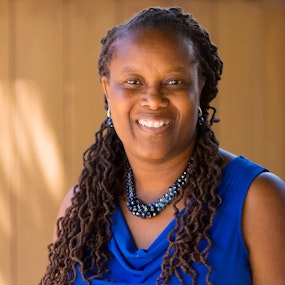
Dr. Cathia Walters
educator, psychologist, relationship coach, and the founder of the Walters Wellness Group in California's San Francisco Bay are
Dr. Cathia Walters (Dr. C) is an educator, psychologist, relationship coach, and the founder of the Walters Wellness Group in California's San Francisco Bay area.
Through the Walters Wellness Group, Dr. C provides support groups, courses (online and in-person), workshops and community events on a variety of healing-related topics. Her courses like Managing Life Challenges course, Black Women's Support Group, and Healing Trauma program have served hundreds of individuals in healing and personal growth. Dr. C's work focuses on compassion in healing and incorporates movement into the healing journey.
Dr. C designs and hosts annual retreats for Black women in Runaway Bay, Jamaica, a biannual retreat for Black couples in Lake Tahoe, California, and a retreat for managing trauma in Costa Rica. Dr. C also provides training and hosts webinars and workshops on a variety of healing and health-related topics for companies and organizations.
As a Black woman, Dr. Walters considers self-care a radical act that begins with the relationship one forms with oneself.
New to Our Friendly World with Fawn and Matt?
Here are some great episodes to start with.

















